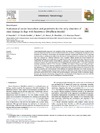Identificador persistente para citar o vincular este elemento:
https://accedacris.ulpgc.es/jspui/handle/10553/73240
| Título: | Evaluation of different dosages of doxycycline during the adulticide treatment of heartworm (Dirofilaria immitis) in dogs | Autores/as: | Carretón Gomez, Elena Morchón García, Rodrigo Falcón Cordón, Yaiza Falcón Cordón, Soraya Matos Rivero, Jorge Isidoro Montoya Alonso, José Alberto |
Clasificación UNESCO: | 310907 Patología | Palabras clave: | Adulticide Dirofilaria Immitis Doxycycline Heartworm Immune Response, et al. |
Fecha de publicación: | 2020 | Publicación seriada: | Veterinary Parasitology | Resumen: | The endosymbiont bacteria Wolbachia plays an important role in the pathogenesis and inflammatory immune response to heartworm (Dirofilaria immitis) infection in dogs. Doxycycline is used to reduce Wolbachia from all life stages of heartworm to avoid large releases of the bacteria during the death of the worms. However, the dose and duration currently recommended have been extrapolated from the treatment of other rickettsial infections. Therefore, the aim was to study the dynamics of Wolbachia IgG antibodies in heartworm-infected dogs under adulticide treatment using different dosages of doxycycline. Forty-nine heartworm-infected dogs were recruited. On day 0 (diagnosis), monthly ivermectin (6 μg/kg) was prescribed, as well as daily doxycycline for 30 days, at 10 mg/kg/12 h (n = 13), 5 mg/kg/12 h (n = 19), and 10 mg/kg/24 h (n = 17). Dogs underwent adulticide treatment and blood samples were collected on days 0, 30, 90, and 120. All dogs had antibodies against recombinant Wolbachia surface protein (rWSP), confirming the important role of the bacteria in heartworm. No significant differences were found in anti-rWSP response by presence/absence of microfilariae, or by parasite burden on day 0. In all treated groups, the anti-rWSP antibody response was not significantly different between days 0 and 30 but was significantly lower between days 0 and 120 (p < 0.05). The results of the present study suggest that the administration of a lower dose than currently recommended is sufficient to achieve a significant reduction of Wolbachia in dogs infected by D. immitis. | URI: | https://accedacris.ulpgc.es/handle/10553/73240 | ISSN: | 0304-4017 | DOI: | 10.1016/j.vetpar.2020.109141 | Fuente: | Veterinary Parasitology [ISSN 0304-4017], v. 283, (Julio 2020) |
| Colección: | Artículos |
Citas SCOPUSTM
11
actualizado el 08-jun-2025
Citas de WEB OF SCIENCETM
Citations
9
actualizado el 01-feb-2026
Visitas 10
392
actualizado el 09-ene-2026
Descargas
559
actualizado el 09-ene-2026
Google ScholarTM
Verifica
Altmetric
Comparte
Exporta metadatos
Los elementos en ULPGC accedaCRIS están protegidos por derechos de autor con todos los derechos reservados, a menos que se indique lo contrario.
